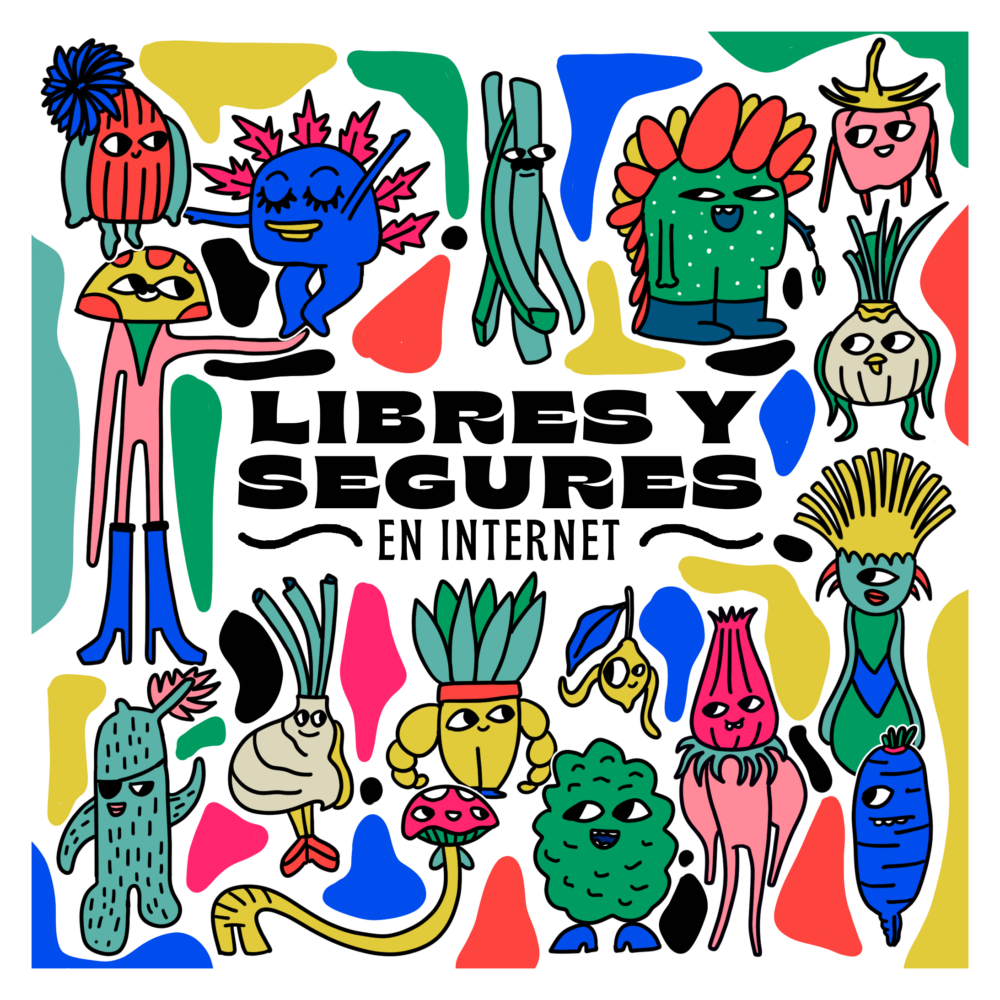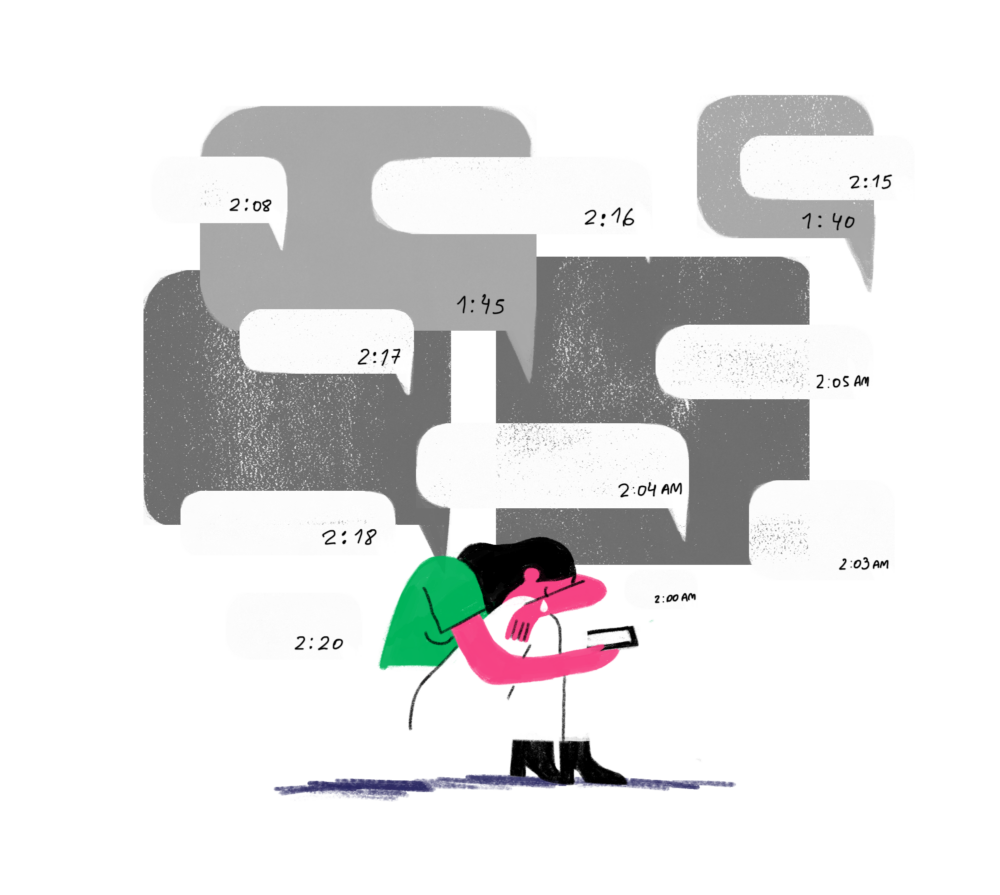A DECADE OF TECHNOLOGY AND HUMAN RIGHTS
Throughout these 10 years, all of us at TEDIC have learned to recognize the enormous potential of civil society organizations as agents of change in a world that urgently needs it. Because of that, we are proud to say that our work and dedication have succeeded in disrupting unfair power dynamics and protecting the fundamental rights of many vulnerable communities.
However, not surprisingly, the threats faced by social sectors have also increased in recent years. In this time, we have witnessed how technology has become part of the problem by serving as a means of instituting and reinforcing injustices, as well as providing new avenues for systematic abuse of power and wasting already scarce resources.
These factors have caused an evident erosion in the conception of technology as a tool able to support the fight for social justice. As a non-profit organization, other major obstacles for our work are the highly competitive environments in which we operate and the limited number of resources available to us. Also, as expected, our work, our ideals and our desire for change make us a constant target of attacks.
However, far from discouraging us, this only fuels our determination: we continue to strive for a safer and more accessible digital environment for everyone.
We now celebrate 10 years in which we have had the honor of sharing learning spaces, growth and support with a diverse group of partners, allies and friends, and we look forward to what the future has in store!
Sincerely,
The TEDIC team

How did it all begin?
It all started in the courtyard of a hostel in downtown Asuncion. There, friends and acquaintances with backgrounds in different professional areas gathered to sign a constitutive act with the objective of creating a formal space of resistance and defense of our digital rights. Therefore, the protection and promotion of human rights on the internet has been the organization’s main goal since the beginning, with a line of work based on legal, technical and political analysis of internet regulations in Paraguay.
TEDIC’S growth was gradual: two years after its creation, Maricarmen Sequera, our current co-director, assumed the presidency of the organization, a position that enabled her to form and manage the first operations team.
To this day, almost all of the co-founders are still on TEDIC’s board of directors. The executive team grew as the number of the organization’s projects increased.
Where are we going?
We dream of a free and safe society on the internet, one that empowers, emancipates and builds technologies that respond to the needs of each territory and that respects all human, civil and political rights.
At TEDIC we argue that technology is not neutral, but rather affects politics and people’s daily lives. Therefore, we believe that it is essential to understand and focus on the current technological context, in which machines and their codes are in the hands of large oligopolistic companies, and the consequences that this entails.
Bearing all this in mind, we must work for greater technological ownership, decentralization and freedom that will lead to a real and political empowerment of this human revolution: which includes the internet, innovative technologies such as artificial intelligence, biometrics, and internet of things, among many others.
10 YEARS LATER, HERE WE ARE
With greater experience and many lessons learned on how to work and influence the Paraguayan technology agenda in the world.
With 6 main topics of paramount importance: privacy and personal data, freedom of expression and free culture, access to public information and democracy, gender and digital inclusion, labor and digital economy, and disruptive technologies.
With national, regional and global alliances that empower us in the debates concerning the digital agenda and support our work so we can have a strategic impact on the national agenda. We are currently part of more than 20 international and national networks engaged in the defense of human rights from a technological approach.
With the ability to listen, empathize and connect with communities, activists, experts, politicians and journalists to collaborate and make a greater impact. This also allows us to identify and focus on the needs of our national, regional and global strategic allies.

Our work
RESEARCH
We believe it is of paramount importance to create spaces and opportunities for research that contribute to evidence-based activism. Since the beginnings of the organization, we have carried out a total of 51 qualitative and quantitative research projects, which have produced data on the intersection of technology and human rights in Paraguay.
TEDIC is committed to continue facilitating information production and contributing to the production of data for the elaboration of public policies based on scientific evidence.
That said, there are 3 research projects that we feel are important to highlight, in the framework of TEDIC’s 10th anniversary:
Digital gender-based violence in Paraguay
Digital gender-based violence is real and needs greater visibility in our country, urgently. This research collected data on women’s access to ICTs and sought to demonstrate experiences of digital gender violence in Asuncion and three cities in the interior of the country, in order to reconsider and broaden the focus of the definition of telematic violence of the Law number 5777/16.
Among the main findings of the study are descriptions of the different types of intimidation, violence and abusive experience reports. It also shows how online violence happens to a greater extent towards women who are public opinion leaders or who have a political position.
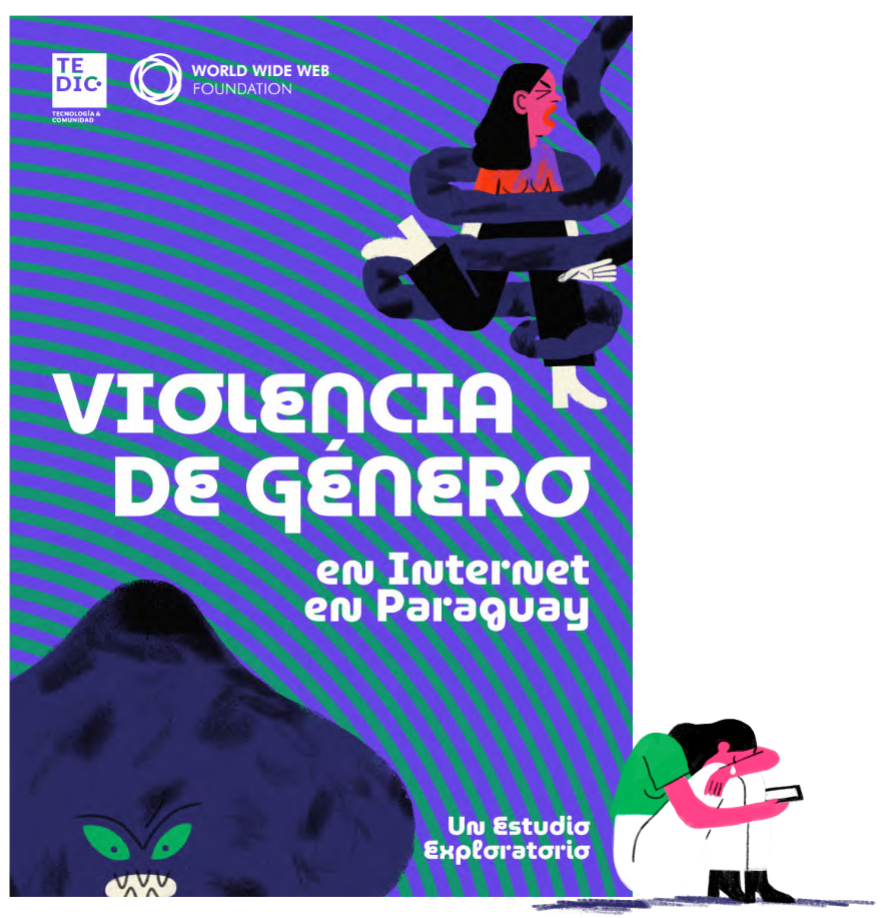
The Technology and Elections series
Our commitment to accompany and monitor the digitalization of the electoral process in Paraguay is firm. Since the decision to use electronic voting machines was made, we have produced a total of 5 investigations that address the issue of the implementation of electronic voting from a technical and human rights perspective.
Thus, we have generated information on documented problems with the electronic voting machines used in Paraguay and the way in which voters in Asuncion interacted with these machines in the 2021 municipal elections. Likewise, we documented the history of electronic voting in Paraguay.
On the other hand, we have conducted research on the use of personal data by political parties for various purposes, as well as the exponential increase in the use of social networks for the distribution of political campaigns. All this was done with a view to awaken the interest of electoral authorities about the situation so that the electoral process could be strengthened.
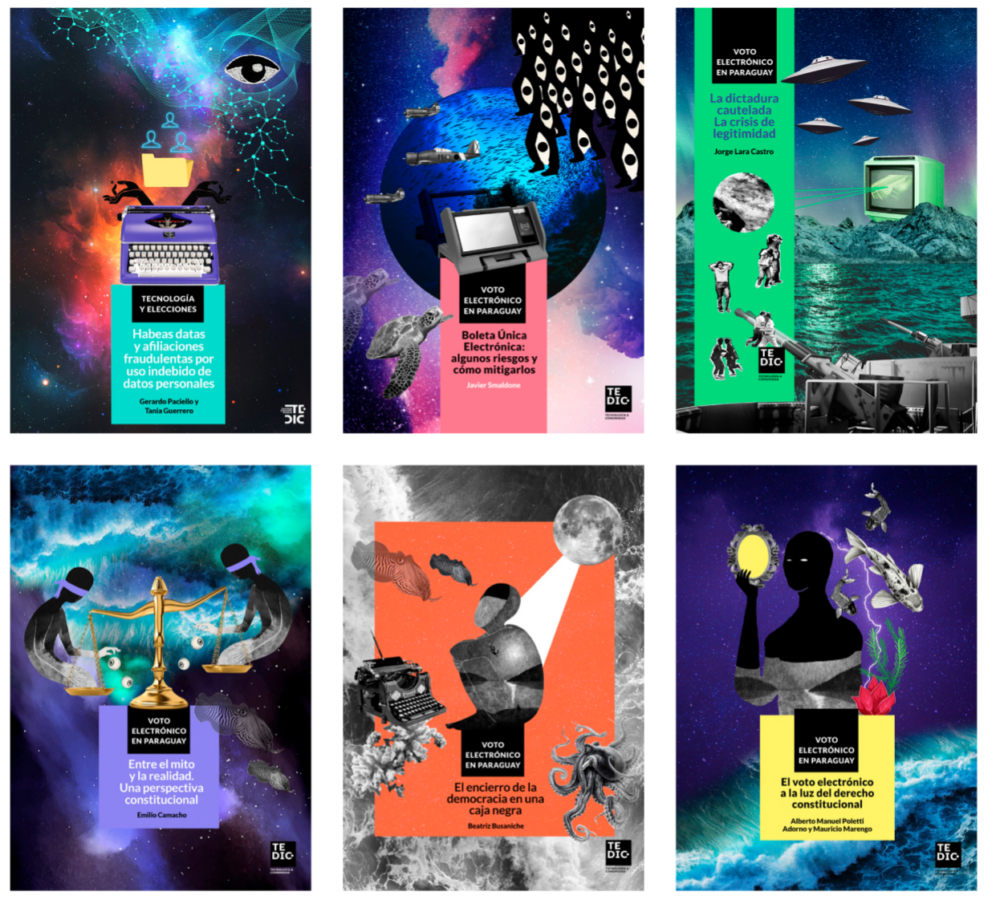
The cryptocurrency series
The impact of cryptocurrencies from an energy sovereignty, environmental and legal perspective is an issue that we have followed very closely. Specifically, we have conducted a series of research on the subject with a view to informing on the novel topic that generates challenges in terms of regulation not only locally, but also internationally.
From the beginning we have focused on research, the use and training in disruptive technologies that allow us to generate an impact both in our national context and within a global agenda. As a result, we were quick to identify blockchain technology as an opportunity to achieve a degree of decentralization and sovereignty on the internet.
Finally, years later, we had the opportunity to develop this series of research with the main — but not only — focus on the impact of cryptocurrency in Paraguay and the region. Our work, however, does not end here: we will continue to monitor the development of this technology in the future.
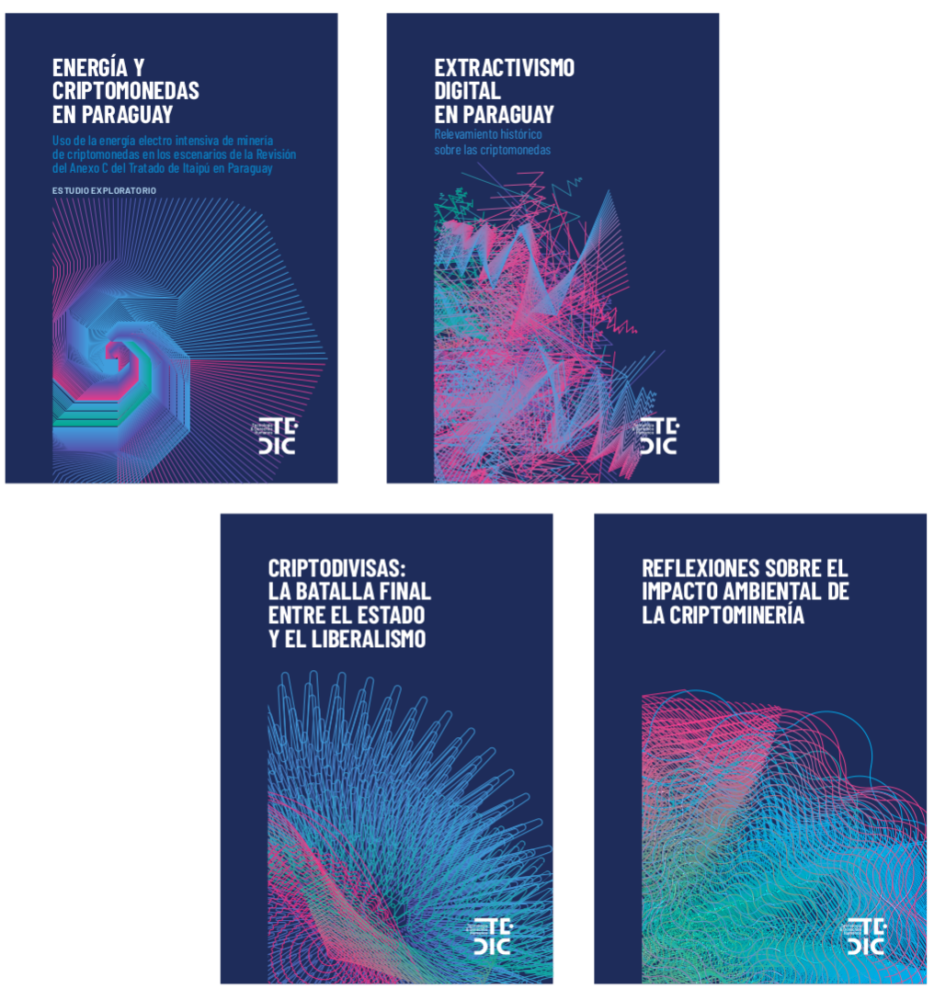
National political advocacy
Since 2012, TEDIC has been working hard on the digital and technology agenda in Paraguay: we can name many challenges and success stories that have marked these 10 years. Here we share some of the most relevant results of our work with the public sector:
Complete rejection of the law against traffic data retention by the Chamber of Deputies: “Pyrawebs”
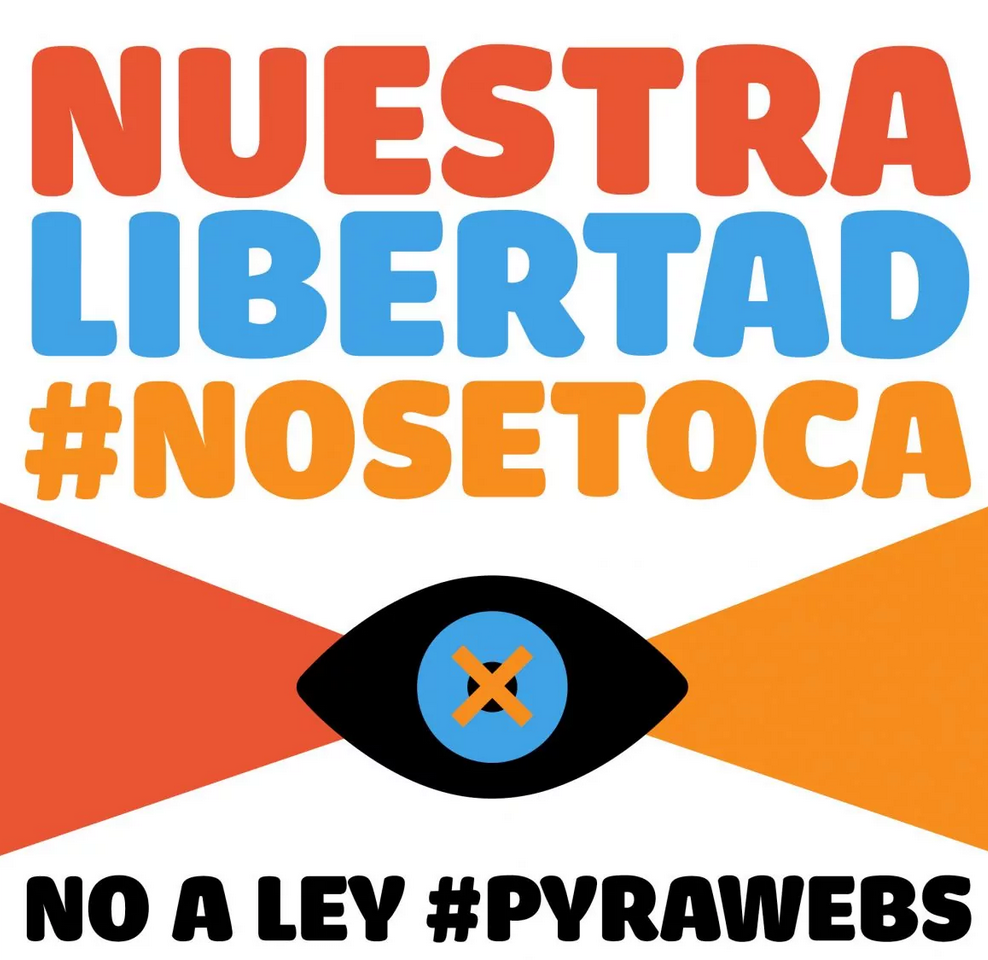
This advocacy campaign on the political agenda was the most relevant in our growth as an organization, since it catapulted us as a trusted organization for the defense of human, civil and political rights in areas of technology.
Law of integral protection of personal data in Paraguay
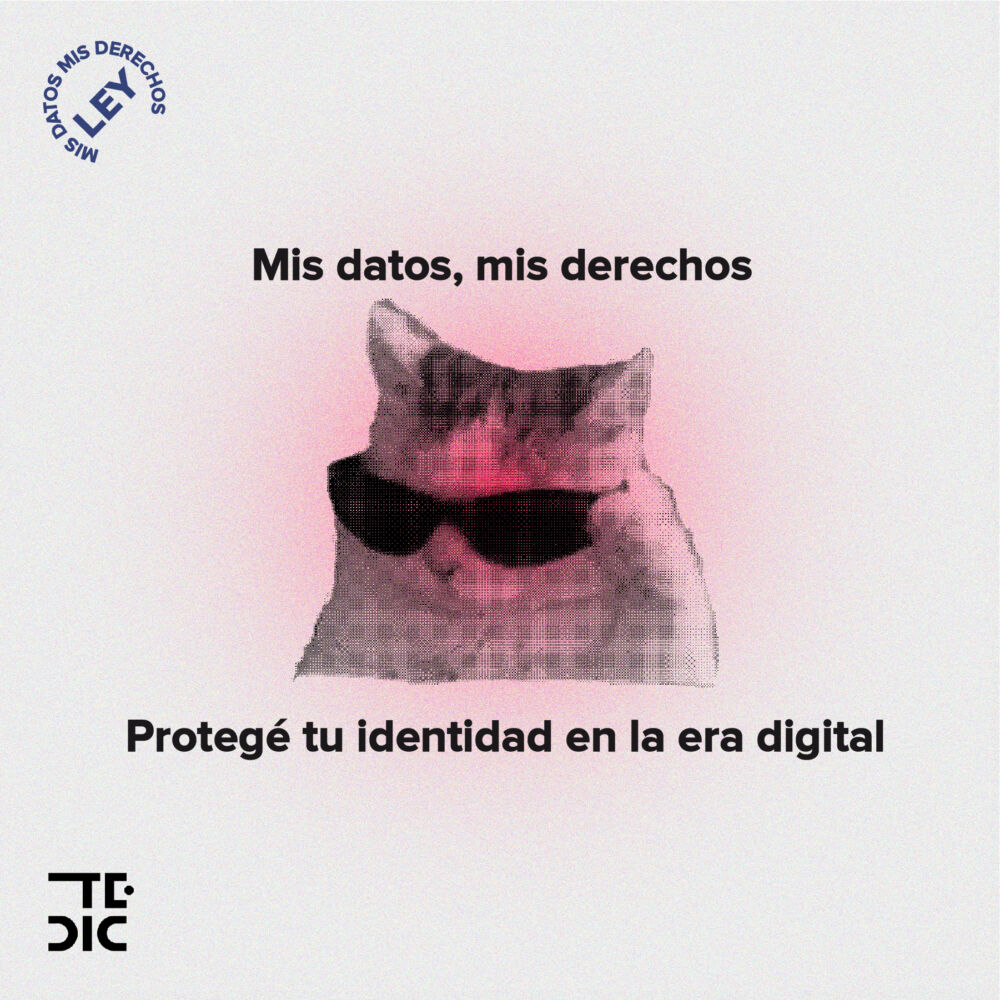
TEDIC is part of, along with other organizations, companies and stakeholders, the Personal Data Coalition, a space to build and influence the National Congress with the aim of achieving the design and implementation of a comprehensive law for the protection of personal data.
Presidential veto of Law No. 5883/2017: “Regulating the activation of the mobile telephone service”
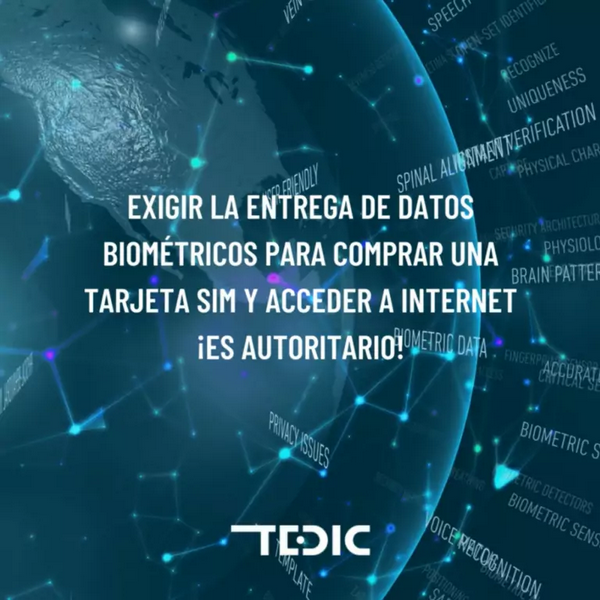
This draft legislation contemplated the use of fingerprints for the activation of a telephone sim card with the supposed purpose of preventing identity theft and prosecuting punishable acts perpetrated through telephone lines.
Political advocacy at the international level
Since we need to engage with human rights organizations around the world to make an impact, our work is interconnected with the global digital agenda. Thanks to this, our work is recognized internationally. Here are some examples.
Campaign #SaveWhatsApp #StopFacebook
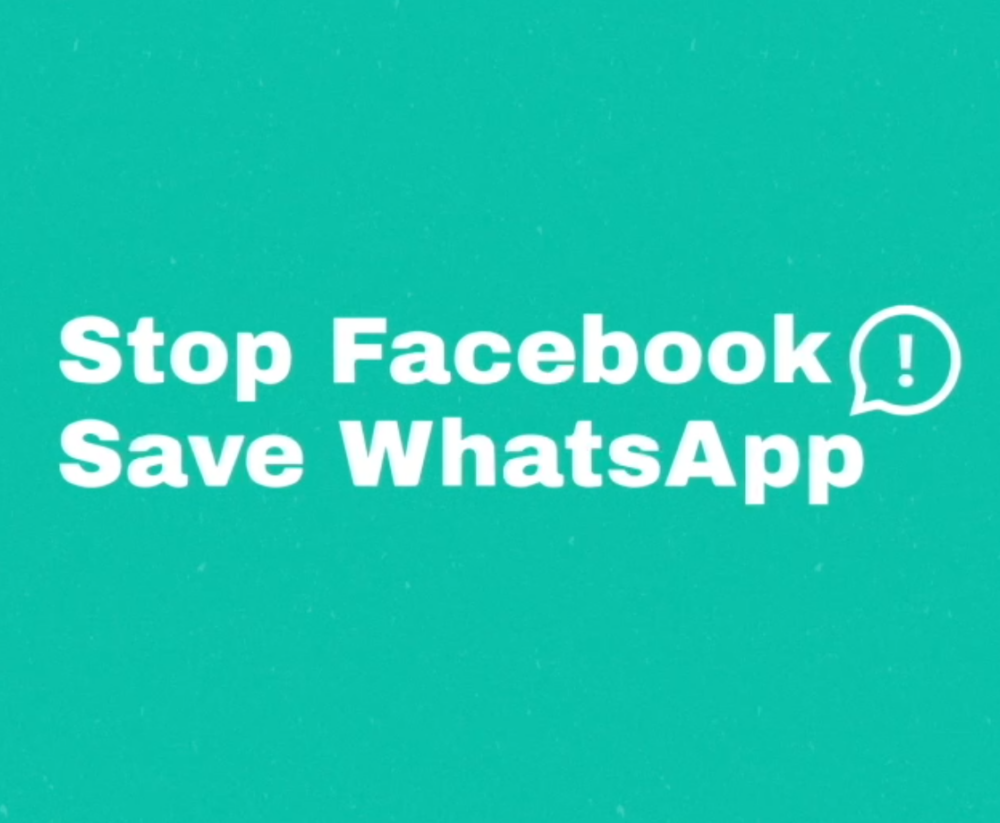
As part of a network of more than 20 global civil society organizations, we support a process of complaint, awareness and resistance to some changes in WhatsApp’s privacy policies and terms and conditions.
Report to the Office of the United Nations High Commissioner on internet outages
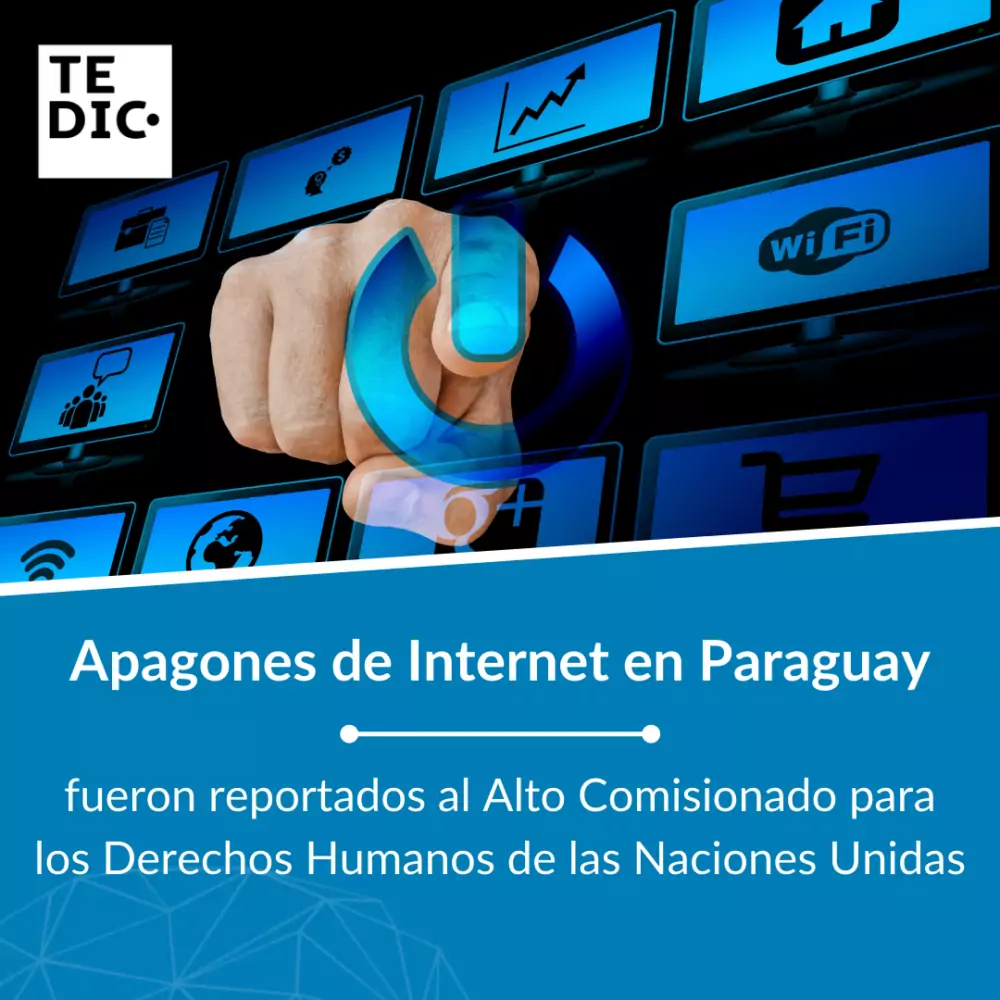
We are committed to guaranteeing human rights in the area of technology and have contributed to a series of appeals that seek to document potential human rights violations in different countries, including ours.
In this regard, it is important to mention that we have reported empirical evidence of internet shutdowns in the northern part of the country, as part of the last call for submissions by the Office of the United Nations High Commissioner.
Attendance at conferences, panels and strategic litigation
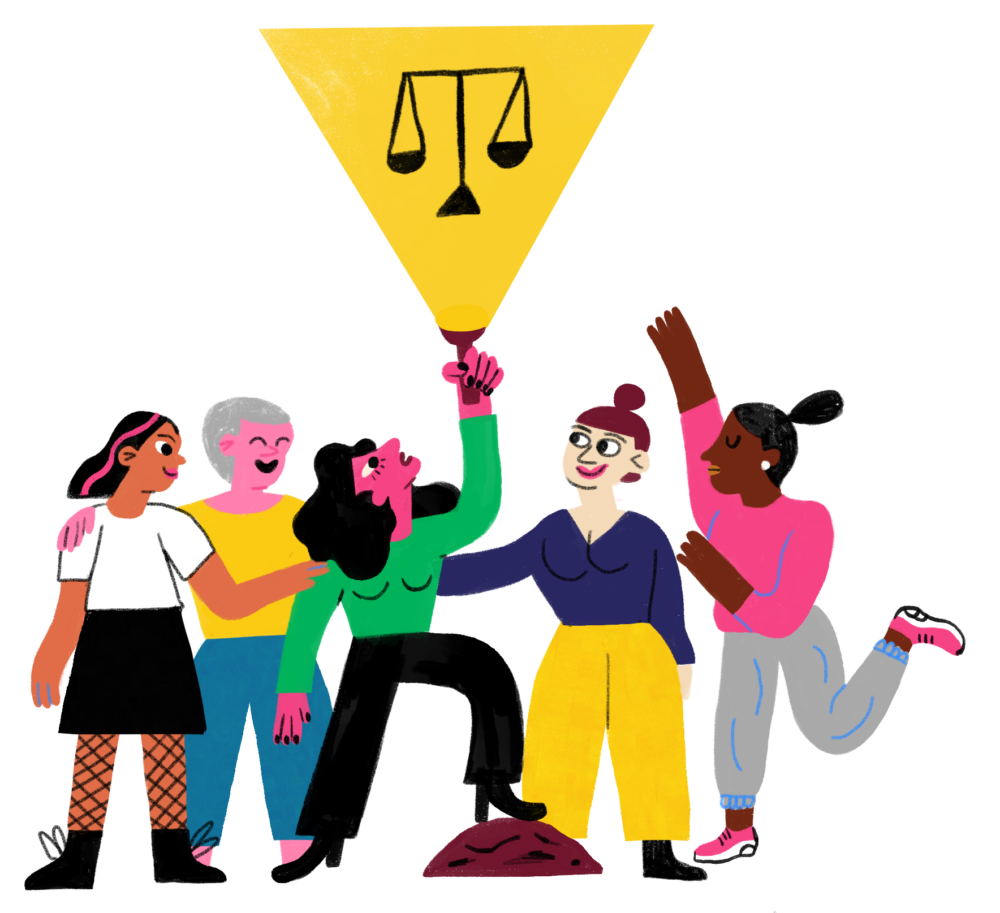
From the beginning, we intended to build bridges with regional and global organizations to exchange outputs and contributions.
This is why every year we participate in panels, conferences, meetings, campaigns and even strategic litigation, which are based on global issues that allow us to articulate and connect with other actors, going beyond the borders of Paraguay. The goal of these events is to echo our reality in other regions and to learn about other realities in order to understand our own better.
Strengthening the Digital Security Community
Since 2015, our organization has been positioned as a reference organization from the global south of Latin America in the strengthening of individual and organizational digital security. Since then, we have conducted workshops and assisted organizations, groups of activists, journalists and digital media for a period of 4 to 6 months with the aim of improving their Internet habits and their safety, and thus exercise their online rights.
Several organizations in Latin America, Africa and Europe receive our technical advice in order to strengthen and protect their identities and information on the internet. To date, we have collaborated with more than 1000 people who have benefited from our training workshops and we have incubated more than 20 organizations and digital media to increase the protection of their institutional communication infrastructures.
Strategic Litigation
One of the most effective ways to influence the political agenda is through strategic litigation: we design with the firm intention to promote clarity, respect, protection and fulfilment of rights. Our idea is to achieve changes in laws, policies and practices that enable redress of human rights violations. Also, through strategic litigation, we seek to raise public awareness of the injustices of human rights violations.
Communication campaigns
A back and forth between the offline and online worlds are essential for the collective construction knowledge: for this reason, we join forces with other national and international organizations to increase the reach of our messages and research.
As we wish to emphasize the virtual exchange of knowledge and experience, we regularly launch communication campaigns that go beyond virtual spaces and resonate in different spheres, whether through discussions in Congress, strategic litigation or raising awareness regarding rights and technology.
The messages of our communication campaigns are known for connecting with different audiences, as we constantly aim that the topics can spread beyond any core demographics. Thus, for example, a campaign that began as a series of messages on our social networks can, over time, lead to pressure for the enactment of a law or perhaps in the mapping of new spaces for discussion where our issues can be inserted. To date, we have carried out more than 30 campaigns.
We work with a communicational approach that exceeds a single channel of emission and reception of our messages, our campaigns are designed holistically with a strong social perspective, in a way that the message can be grasped by a wide audience, without the need for technical or specialized knowledge. Our goal is always to reach as many people as possible in order to contribute to the construction of digital spaces where respect for our human rights is guaranteed.
In the following pages we present some of the communication campaigns that had an impact at national and international level, that opened the doors to our continuous growth and that gave us the impulse to continue making relevant contributions on current issues alongside our audience.
Development of civic technology for social change
During the early years, TEDIC’s main focus was to develop civic technology. Out of 9 technology projects, 3 are active and have generated great impact and evidence that translates into an important support to the fight for the defense of our rights.
Antipyrawebs – digital rights trend mapping
It is an online repository, free to access, that brings together the private sector, government, academic and civil society initiatives that directly or indirectly influence on the rights of individuals on the internet at the local and regional level.
This space allows monitoring facts related to policies affecting privacy, freedom of expression, copyright, net neutrality, cybersecurity and gender issues, as well as other fundamental principles and rights on the internet in the press, social networks and even in opinion articles (blogs).
Defensores
The Defensores project seeks to eradicate torture and police abuse practices in Paraguay. It is based on two main components: a web platform and a mobile application that allow the registration of cases of torture in police stations and penitentiaries in Paraguay.
These tools allow public defenders to carry out effective and permanent monitoring of these type of practices. At the same time, they allow the generation of qualified information for the supervision of institutions involved in the protection of human rights — such as the Ministry of Public Defense or the National Mechanism for the Prevention of Torture —, the media, journalists, civil society organizations and the general public.
This project seeks to achieve a systematization that will lead to the visualization and later elimination of these despicable practices of torture and ill-treatment.
El Avizor
A tool that geo-references reports of violations to the Electoral Code. With El Avizor, anyone with a cell phone or mobile device has the possibility to document irregularities on voting day with a text accompanied by photos, videos or audios. Later, irregularities will be located on a map that can be accessed by anyone who wishes to do so.

Reflections & lessons
Articulated and collaborative work as the only possible path
Cooperative work is the key to a society that fully enjoys the exercise of its rights in the physical and digital environment. In this sense, the multistakeholder model, which prioritizes debate and exchange between different stakeholders for the construction of public policies, is the only path if we want to achieve laws that are representative of the popular will.
Gender mainstreaming as a commitment and a road map
Gender equality challenges and energizes us to continue working towards an equal society in the physical and digital spheres. In a country like Paraguay, where women and people who belong to diverse groups are constantly subjected to different types of violence, it is particularly important to continue promoting projects and initiatives that incorporate the gender mainstreaming by design.
Commitment to local and international advocacy
Advocacy at the local and international level for the generation of public policies based on scientific evidence is a topic that we are passionate about and that continues to generate effective results. In these 10 years of influencing public and private policies, we have understood the importance of occupying spaces at the local and international level in order to promote different arguments in spaces of diverse nature and aim at networking at various levels to achieve social change that benefits our communities.
People & places
In this decade of work, we have met people from all over the world: some of them visited us in Paraguay and we visited others in their home countries.
Although the 2 years of the COVID-19 pandemic kept us working from home, we had the opportunity to meet and build partnerships in more than 50 organizations from different countries. We shared panels, conferences, Jitsi windows, Zoom, and other spaces with consultants, partners from other national, regional and global organizations. Coffee, wine, chipa, music and the exchange of everything we produce at TEDIC worked as themes that allowed us to consolidate links, friendships and alliances throughout the world with the aim of continuing to think and build a more accessible, fair and secure digital space where our human rights are respected and guaranteed.
These 10 years would not have been possible without the cooperation of all the people who support us; without the teamwork with so many organizations and people we have met during this decade; without the conviction that we are moving towards a more democratic society and aware of the need to respect and guarantee human rights in all spaces, physical or digital.
For all this and much more: THANK YOU!


